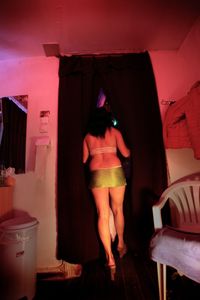Brothels in Athens have a hidden scenario of sexual slavery business. They serve as a legal background for trafficked women from Eastern Europe and Africa into Northern, Central and Western Europe and USA since the early 1990s. Greece, due to its geographical position as well as political and social factors, became the cross road and destination country for women trafficking. Greece, the cradle of the civilization, hosts today approximately 20,000 trafficked women forced into the sex industry.
The fall of communism was accompanied by economical and political chaos, creating a huge unemployment rate, poor livelihood prospects and a low level of education. These factors make many young women vulnerable and with the desire to escape poverty in a foreign country.
Girls, having "fairy tale" dreams about a beautiful life waiting for them abroad, are recruited believing they are being given help to find work by traffickers who are not always strangers. They migrate willingly thinking that they will marry a business man, or that they will have a more prosperous job as a waitress or dancer making a lot of money. Yet instead they end up locked in apartments and brothels without seeing the light of day for months, often serving 20 - 35 clients per day being physically and mentally raped, with their only proof of identity taken away from them, and far away from home.
Brothels are located broadly in entire streets, one besides each other, in diverse areas of the city. Each one with its own entrances (most of them have backdoors), colors, atmosphere and “Madams”. Madams are ladies, over 50 years old, who manage the brothels making sure the girls don't get the opportunity to leave. Officially there are 250 licensed brothels in the city of Athens and approximately two-thirds of them carry trafficked women, according to a local association, Nea Zoi, Association for Support & Restoration on Individuals in Prostitution. Research headed by Dr. Grigoris Lazos, a professor of criminology at Panteion University in Athens, indicates that during the decade 1990-2000 approximately 1,700,000 men in Greece used trafficked women, (even among people in positions of authority), which represents, 6.4% of the population in Greece (10.816.286 - 2011 census).
In this time of crises, signs of rental and selling of business places are spread everywhere as well as the new brothels in different areas of Athens. In a period of 4 months, 6 brothels were open in another central neighbourhood of the city, all within an 8 block radius.
Gang bosses and ‘pimps’ often warn the abducted women that their family members back home will be hurt or killed if they go to local authorities. Most of the times when they manage to return to their homeland, it is with the help of a client who handled sending back the girl. Back home, the girls face psychological problems and shame. Most of them never reveal to their families the horror of what really happened while they were away.











